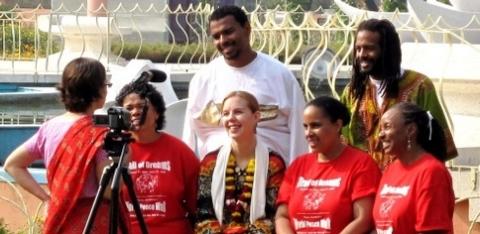“Religiously motivated hostility has reached a 5-year high. Over 6 billion people – or 76% of the world’s population – live in places with high or very high levels of restrictions on religion, up from 68% in 2007"
--UN Ambassador Samantha Powers
The Trail of Dreams World Peace Walk occurred from 2005 to 2009. Prior to the walk we (Peace walkers in training – Karen Hunter Watson, Anefawose Shina, Natalie Scott Williams, Chandelle C. Binns, Lessie Pat Randal and I) confronted the notion of “difference” and shared our reactions and fears around difference: difference of culture, language, customs, religion and spirituality, race, gender, class, boarders, transportation, perceptions, etc.
In the end we adapted an approach shared by Chandelle, a member of the team: “When we reach the point of fear or overwhelm in relationship to “difference” as we walk for peace, remember to stop and drop – from the head to the heart and feel our way through the experience.”
It is important to know who we, the Trail of Dreams World Peace Walkers, were. We were of Muslim, Christian and Indigenous religious beliefs, racially mixed (an ancestral mix of African, European, and Native American); our ages ranged from four years old to 84 years of age. One member of our team was in a wheelchair, in the 4th stage of Alzheimer’s. We were straight. We were gay. We had to blend all of these differences in a way that allowed us to become family, centered in a shared vision of peace and transformation.
As we moved through the next three and a half years, the “differences” began to blur and the commonality of the heart felt values, core values, of those we met transcended religious/spiritual beliefs, race, age, gender -- and brought us into the homes of all races, class and cultures; brought us into religious and spiritual environments beyond our own varied traditions. We slept in and shared services/ceremonies in Buddhist Temples; Hindu Ashrams; Native American Churches, Islamic masques, Aboriginal ceremonies and homes, Christian churches … I could go on and on.
Honestly, this entire experience never should have happened, yet our shared vision that,“we could change and transform the world -- beginning with ourselves” was so naively huge – so huge, that we were unstoppable. We could not see outside of this possibility. So one step at a time we showed up to what showed up!
If we were at any time constrained by religious sanction, we never – ever would have made it past our own homes. If this journey had never taken place, I would not know the awe of being at the Golden Temple; I would not know the beauty and grace experienced in the Native American Church ceremony. I would not know the incredible peace as the calls for prayer sounded through the Islamic community where once we stayed while on the journey. I would not know the heart of families around the world who had so little material means but would take us in to their homes and care for us with such love. I would not have witnessed men of every faith taking my mother as their mother, carrying her in their arms as though it was a holy privilege.
Our experience, on the scale that we walked on six continents, was a demonstration that peace prevails. We never would have made it home had that not been the case.
The statement above by Ambassador Samantha Powers compels me to continue to walk this path of ending religiously motivated violence with even more determination and commitment. One thing I learned on the walk was one person does change the world. We have to be relentless is telling the stories that prove this to be so.
Ending the disparities that entrench injustice, the violence of poverty and oppression, the disregard of our Earth for the sake of profits will ease the constriction that feeds religious isolation and radicalism and allow for the expansion of awareness of shared values and a deep sense of mutuality. As Dr. Martin Luther King, Jr. said:
“I am cognizant of the interrelatedness of all communities and states. I cannot sit idly by in Atlanta and not be concerned about what happens in Birmingham. Injustice anywhere is a threat to justice everywhere. We are caught in an inescapable network of mutuality, tied in a single garment of destiny.”
Religion and spirituality are the sanctum that offers each of us a sense of self in relationship to something greater than ourselves. At a time when the world appears to be shifting like sand on a beach, uncertainty appears to be the only constant. This fosters a sense of not being in control, leading to feelings of powerlessness and overwhelm. It becomes easier in this climate to look for the “other” to blame. And, the “other” is anything that makes us different – anything (religion, spirituality, race, gender, class, etc.).
Therefore, while we work to end religiously motivated violence, we must also seek to be advocates for what is right, what is just, what is truth. To do anything less only perpetuates our complicity in the religiously motivated hostility that is becoming more and more prevalent in the world.
I have a sincere commitment to the United Religions Initiative’s vision to end religiously motivated violence, build cultures of peace, justice and healing for the Earth and all living beings. Together we must dare to be as naive as the Trail of Dreams World Peace Walkers -- not able see outside of this inevitability.
